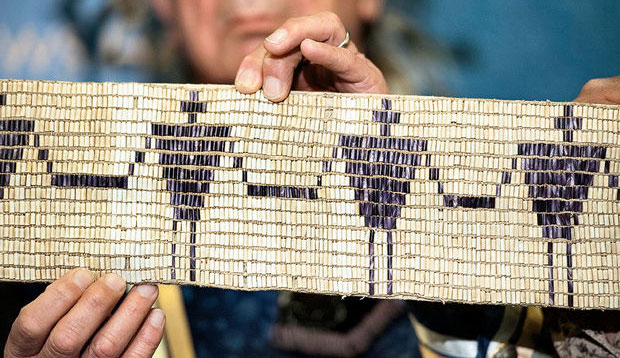
 Washington, DC – On April 15, 2014, the Onondaga Nation filed a Petition against the United States with the Inter-American Commission on Human Rights (IACHR), part of the Organization of American States (OAS). A goal of OAS is to achieve an order of peace and justice within the Americas, which the Onondaga Nation is seeking with this petition.
Washington, DC – On April 15, 2014, the Onondaga Nation filed a Petition against the United States with the Inter-American Commission on Human Rights (IACHR), part of the Organization of American States (OAS). A goal of OAS is to achieve an order of peace and justice within the Americas, which the Onondaga Nation is seeking with this petition.
[lightbox link=”http://www.onondaganation.org/wp-content/uploads/2014/04/wahington_joe_heath.jpg” thumb=”http://www.onondaganation.org/wp-content/uploads/2014/04/wahington_joe_heath-300×247.jpg” width=”300″ align=”right” title=”wahington_joe_heath” frame=”true” icon=”image”]“Since 1788, 2.5 million acres of land have been stolen from the Onondaga Nation by New York State,” said Joe Heath, General Counsel for the Onondaga Nation. “The failure of the US court system to protect the Onondaga Nation’s ancestral homeland has left the Nation with no choice but to seek assistance for human rights violations from the international community.”
Onondaga Nation leaders announced their Petition against the United States by holding a press conference in front of the White House.
“We brought the Canandaigua Treaty belt commissioned for the Onondaga Nation by President George Washington back to the White House,” said Tadodaho, Chief Sidney Hill. “We brought this belt remind the United States of our peace and friendship and our promise to work as brothers in treating each other as sovereign nations.”
In 2012 the Onondaga Nation brought this historic belt to Washington in one of their final attempts to keep alive their case in the United States Federal court system. (photos)
FAILURE OF DOMESTIC COURTS AND NEED FOR INTERNATIONAL ACTION
[lightbox link=”http://www.onondaganation.org/wp-content/uploads/2014/04/washington_sid_hill.jpg” thumb=”http://www.onondaganation.org/wp-content/uploads/2014/04/washington_sid_hill-300×223.jpg” width=”300″ align=”right” title=”washington_sid_hill” frame=”true” icon=”image”]The Onondaga Nation filed a land rights action in the United States District Court on March 11, 2005, which the federal court dismissed. The Nation then appealed to the Second Circuit Court of Appeals, which affirmed that dismissal. Finally, the Nation filed a petition for a writ of certiorari with the Supreme Court seeking review of the dismissal and its affirmance.
“On October 15, 2013, the Supreme Court denied that petition,” added Joe Heath. “Therefore, no further remedy is available for the Onondagas in the United States court system. As a United States citizen working on behalf of the nation, this saddens me as the case’s merits were never heard in court.”
The response from the U.S. courts bars the Nation from any domestic remedy for these treaty violations, and refuses the Nation any chance to articulate the violations of New York State dating back to the late 18th Century.
“The federal courts’ inherently discriminatory ruling refused to consider the merits of our case,” said Chief Hill. “Our claims for relief arise from violations of treaty protected land rights. The court ruled that our actions are too old and “inherently disruptive” and, therefore, cannot be considered. We believe that the actions of New York State continue to be disruptive to the people of the Onondaga Nation.”
The ultimate purpose of the Onondaga Nation in the assertion of its land rights is to enable the Nation to maintain its culture and way of life, and to protect the earth and its environment for all inhabitants of central New York. The Nation’s Land Rights Action has not been disruptive.
“The Nation is asking to continue the healing process between themselves and others who live in the region,” added Joe Heath. “The Nation is searching for positive ruling that would allow them to continue its role as an environmental steward of the land and waters it once conserved for centuries.”
In its petition to the Inter-American Commission on Human Rights, the Onondaga Nation demonstrates that the denial of any remedy for the taking of their land and the treaty violations are a human rights violation under the United Nations Declaration on the Rights of Indigenous Peoples, the American Declaration of the Rights and Duties of Man, and other international agreements.
Chief Hill stated, “A positive result for the Onondaga Nation at the OAS could establish a framework to resolve the ongoing dispute and offer a case study for indigenous peoples barred access to justice by the U.S. court system. And begin the healing process.”
Read the petition and information regarding the Onondaga’s Land Rights Case.
